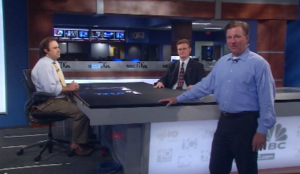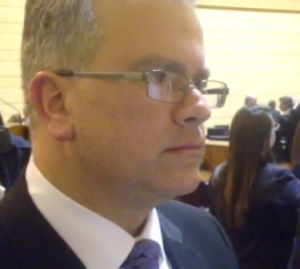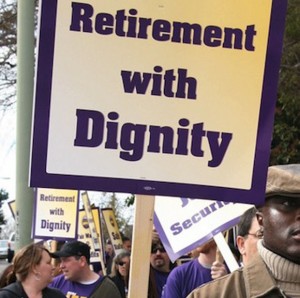 The candidate who sues the ratings agency will be the next governor, I told Justin Katz and Bill Rappleye on this week’s NBC 10 Wingmen. To me a lawsuit seems like the best way to punish the ratings agencies – who BY ALL MEANS should be punished. But – so far, it seems to me – the state’s likely to spend less money going forward by paying our $12.5 million (not legally-binding) obligation this year. Assuming you support future public infrastructure.
]]>
The candidate who sues the ratings agency will be the next governor, I told Justin Katz and Bill Rappleye on this week’s NBC 10 Wingmen. To me a lawsuit seems like the best way to punish the ratings agencies – who BY ALL MEANS should be punished. But – so far, it seems to me – the state’s likely to spend less money going forward by paying our $12.5 million (not legally-binding) obligation this year. Assuming you support future public infrastructure.
]]> Senate President Teresa Paiva-Weed and House Speaker Nick Mattiello just made a striking shift about the 38 Studios bailout, which is interesting since they both have a history of supporting the bailout.
Senate President Teresa Paiva-Weed and House Speaker Nick Mattiello just made a striking shift about the 38 Studios bailout, which is interesting since they both have a history of supporting the bailout.
Go back to what Paiva-Weed, and former Speaker Gordon Fox, said when the 38 Studios bonds were being issued. At that time, in 2010, Fox and Paiva-Weed told Wall Street’s credit-rating agencies that the state would bail out 38 Studios bondholders if 38 Studios was unable to pay, although the Rhode Island Constitution forbids the General Assembly to “pledge the faith of the state for the payment of the obligations of others” without voter consent. Still, even though our constitution is meant to give voters the right to have a say whenever the state is pledged to pay, Fox and Paiva-Weed did their best to get around our constitutional right and signaled that they would get the General Assembly to do a bailout if one was requested. The rating agencies decided to act as if there really was a promise by the state to pay, as if it really was state debt—though of course our state really didn’t have any kind of obligation, because the procedures that the constitution designed to protect taxpayers were never followed. Since the Speaker and the Senate President were in favor of making taxpayers pay for a bailout if need be, their perceived unofficial clout was enough to make some Wall Streeters think they could profit from participating in this dirty deal, even though 38 Studios didn’t seem to have a very viable business.
But the State House leaders are taking a different line in today’s Providence Journal. Paiva-Weed now says that what she said to the rating agencies in 2010 is not binding now, and Mattiello similarly says that he’s not bound by what Fox said then even though Mattiello had been Fox’s #2 at the time. Instead, Paiva-Weed and Mattiello now say that they’ll look at what’s best for Rhode Island right now (since we all know that our State House leaders are dedicated to figuring out what’s best for Rhode Island).
Paiva-Weed has been a longtime bailout supporter. Last June, when the House was debating the state budget, Mattiello was a big advocate on the House floor for bailing out 38 Studios bondholders. This year, Mattiello is often portrayed in the media as someone who hasn’t taken a position about a bailout. In today’s story, Paiva-Weed and Mattiello don’t say that they’re against the bailout. And I wouldn’t be surprised if they go back to saying that taxpayers should pay for this debt which we don’t owe, like they’ve said in the past. But they’re now saying that if they come out in favor of a bailout it will be because of what’s best for the state right now, not because of the personal pledge to the Wall Street rating agencies that was made in 2010.
It’s no secret that the 38 Studios bailout is very unpopular. The strongest advocates for a bailout have been those in high-ranking positions, like Fox and Paiva-Weed and (last year) Mattiello. After all, it’s generally those in high places who arrange all sorts of shady deals like 38 Studios, and it helps them if they can continue the tradition that those who seek to profit from these dirty deals will always be assured of being paid. If you go a little further down the power ladder to the representatives who were actually elected by voters, there was a serious rebellion last year against doing the bailout. And of course the bailout is even more unpopular among the voters themselves, who are the least powerful in this debate, which is why there was an effort to stick them with the bill in the first place.
From what I hear, a sizeable number of politicians who have to face the voters are planning to vote against the 38 Studios bailout this year, though there are also lots of politicians who are holding out against the voters’ will and supporting a bailout.
What I notice about the statement in today’s Projo by Mattiello and Paiva-Weed is that it’s exactly the kind of thing that would provoke the Wall Street rating agencies. Paiva-Weed is pretty clearly going back on what she said to the rating agencies 4 years ago. Mattiello is making a similar shift, even though he’s known to belong to the same clique as former speaker Gordon Fox and the preceding speaker William Murphy. Because Paiva-Weed and Mattiello said what they did in today’s Projo, we’re likely to see a downgrade by credit-rating agencies now that’s quicker or more severe than it would have been if Paiva-Weed and Mattiello had said nothing.
If Paiva-Weed and Mattiello have decided that they need a big downgrade to scare people into supporting the bailout, they’re doing exactly the right thing to anger the credit-rating agencies and provoke a big reaction, even though Paiva-Weed and Mattiello have always been careful not to suggest that they’re actually against a bailout. If all this works, we get a serious ratings downgrade, the politicians pass the bailout again, the crooks on Wall Street immediately put us back to a higher rating, and our unelected leaders get to preserve their reputation as people who can insure that those who want to be paid in these kinds of dirty deals will get a taxpayer bailout.
Let’s remember, by the way, that our credit rating is actually not the most important thing. Good investors look past the credit rating on a bond and do their own due diligence to see whether the bond is a good investment. They have to do that, since the credit-rating agencies got a reputation for doing shoddy work during the financial crisis, putting AAA ratings on investments that were worthless.
I assume that the rating agencies will lower our state’s credit rating, even on the legally binding voter-approved debt that’s obviously going to be paid no matter what happens. So yes, ratings agencies can certainly make these unjustified ratings as a way to pressure us into a bailout, but those rating agencies don’t speak for the whole market. Whether the rating agencies lower our voter-approved bond rating to BBB, or further to B, or even to D, doesn’t matter as much as what investors are willing to pay.
It’s traditional for rating agencies to retaliate, but it’s the business of smart investors to look instead at whether their investments will make a profit. Since we’re a small state that needs to sell only a small number of bonds, we only need a few smart investors, as I explained earlier. So let’s put aside the hype about credit ratings. Focusing on retaliatory credit ratings downgrades, rather than on what’s a good deal for investors in our voter-approved bonds, is exactly what people do when they want to present a slanted case for a bailout. For investors who want to buy legitimate, voter-approved bonds, we can actually offer a better deal when we don’t let the insiders waste our scarce taxpayer money on bailing out their dirty deals like 38 Studios.
]]>THE 2010 BONDS AND THE INTEREST THEREON DO NOT CONSTITUTE A DEBT, LIABILITY, OBLIGATION OF THE STATE OR ANY POLITICAL SUBDIVISION THEREOF (OTHER THAN A SPECIAL OR LIMITED OBLIGATION OF THE ISSUER) AND NEITHER THE FAITH AND CREDIT NOR THE TAKING AND TAXING POWER OF THE STATE OR ANY POLITICAL SUBDIVISION OR MUNICIPALITY THEREOF IS PLEDGED TO THE PAYMENT OF THE 2010 BONDS OR THE INTEREST THEREON. THE ISSUER HAS NO TAXING POWER. THE OBLIGATION OF THE STATE TO MAKE PAYMENTS FOR DEPOSIT INTO THE CAPITAL RESERVE FUND IS SUBJECT TO ANNUAL APPROPRIATION BY THE STATE GENERAL ASSEMBLY.
 As if this isn’t enough, the paragraph is repeated verbatim (also in solid capitals) in the body of the document, on page 2, and again on page 11. And there are other sentences to reinforce it, too. So my question is which other sentences in the prospectus are to be ignored? Is there some secret legal code that says that if it’s repeated three times in all caps it doesn’t count?
As if this isn’t enough, the paragraph is repeated verbatim (also in solid capitals) in the body of the document, on page 2, and again on page 11. And there are other sentences to reinforce it, too. So my question is which other sentences in the prospectus are to be ignored? Is there some secret legal code that says that if it’s repeated three times in all caps it doesn’t count?
If the above paragraph doesn’t mean what it plainly says it means, what about this one (on page 4):
Interest in the 2010 bonds will be payable on May 1, 2011 and semi-annually thereafter…
That one, of course, is not all caps, and it only appears once, so maybe that’s the key difference why this clause is inviolate while the others apparently don’t appear at all in a practical sense.
As you read further, you can see that there was no hiding the nature of the investment from investors. These bonds say “38 Studios LLC” in their title, and Curt Schilling is identified on the third page as chairman, founder, and part of the “visionary team.” His name appears 11 times throughout the document. There is a long description of the company on page 18, that says the company is “developing an original fantasy story” which seems about right, but apparently they aren’t talking about their business plan, but the setting for their video game.
Another thing you can see on the emma.msrb.org site is that some of the fears about damage to the state’s bond ratings are not overblown. A slew of bonds sold by the airport (through EDC, the same as the 38 Studios bonds) last December are already rated “BBB+” by Moody’s and S&P, downgraded from the previous AA rating.
On the other hand, what’s really important is the financial consequences. Not many bonds are sold with that low a rating, so comparisons are a little challenging. But I see that those bonds sold for yields of from 3% (1 year) to 4.375% (15 year), a better rate than similarly rated securities from Missouri and Texas got last fall.
In other words, what damage there will be may already have been done. Not only are we hearing that we will be punished for imagining that words in a bond prospectus should have their plain meaning to bond investors, but we are already being punished for even having the temerity to discuss the proposition. This is nothing more than financiers desperate to be made whole for their own misjudgments, feeling confident they can browbeat the state into doing it, and then doing so.

And it will probably work, too. The threats of the bond rating agencies are very effective, since your governments, at every level, are big borrowers. And because they do this borrowing as mere customers, they have to do whatever the bankers say. Which is strange, because yours is a state with billions of dollars in assets. An individual or company that controlled that much money would reject the kind of treatment our governments think is routine. Indeed, the hold of the financial industry over governments in America is a lasting disgrace, a blot on our nation, and the threats we’re all hearing is only the latest shameful chapter.*
It would be one thing to accommodate the financial industry if it were holding up its end of the bargain, but it does not. Why do agencies like RI Commerce (formerly EDC) and the Providence Economic Development Partnership exist, in virtually every state, county, and city in the nation? It’s because of capital market failures. There are qualified business borrowers all over the country who cannot get access to the capital they need to grow, and their entreaties to governments across the country have conjured into existence agencies like EDC and PEDP. Obviously, these agencies are subject to corruption, but corruption is not why they exist. They exist because of a private market failure to allocate capital in a public-good-maximizing fashion, in city after city and state after state.
The choice ahead is not between go along with the financial industry and remain unharmed or resist and be crushed. The choice is to go along with the financial industry that is already punishing our state — and whose spokesmen cannot promise they will not punish us anyway — and resisting the threats to find a better way. Senators and representatives who choose to resist have a special duty to seek alternatives to the financial industry in its current state. These exist, and are in place in other states and other countries around the world. It’s long past time we learned from those examples, and understood that the public good is not the currency of our nation’s financial markets.
*I wrote a book about this: Checking the Banks.
]]> “The pension reform debate is … a dispute over which members of society will have to make sacrifices and which ones will not,” Rolling Stone magazine’s Matt Taibbi tells GoLocalProv.
“The pension reform debate is … a dispute over which members of society will have to make sacrifices and which ones will not,” Rolling Stone magazine’s Matt Taibbi tells GoLocalProv.
Long before Ted Seidle parsed pension cuts as a wealth transfer from Rhode Islanders to hedge fund managers, this was the non-labor left’s biggest issue with the struggle to save public sector retirement security by taking money away from public sector retirees. It is inherently wrong to ask the people who played by the rules (labor) to fit the bill for those who didn’t (management).
I would argue that Raimondo’s star power, bolstered by anonymous out-of-town money and an adoring local media unwittingly conspired to make a very regressive pension reform proposal seem the only sensible thing to support. There is math component to the political problem that is pension reform in that a deficit exists. But the morality part is what we do about that. All too often in today’s political climate, very powerful people spend a lot of money saying the way to fix this deficit is to take from the poor and give to the rich.
Personally, I’d much prefer to live in a financially bankrupt society than a morally bankrupt one and by foisting all the responsibility on retirees, Rhode Island legislators may have made prudent moves away from the former, but they also made foolish leaps toward the latter.
Here’s Taibbi’s response in GoLocal:
For the record, I appreciate Treasurer Raimondo’s thorough response. I understand this is a tough issue and there are heated opinions on all sides. She was gracious enough to speak to me at some length before the article came out, and she did so probably knowing that the article was going to be critical. She clearly believes she is pursuing the correct policies and the fact that she was and is willing to openly engage critics in discussions about those policies is absolutely to her credit.
However, nothing in the response released by her spokesperson Joy Fox yesterday makes me believe that we got the story wrong.
Raimondo dismisses me and her union critics as politically and ideologically motivated, which is fine and understandable. But she doesn’t acknowledge that her own decisions and policies are similarly political and ideological. She presents herself as merely a technocrat who “puts politics aside” to do what’s best for Rhode Island.
But this is wrong on its face. The pension reform debate is the ultimate political and ideological argument. It’s a bitter fight over resources, a dispute over which members of society will have to make sacrifices and which ones will not.
The advocates of pension reform, not just in Rhode Island but across the country, believe that ordinary public workers — teachers, police, firemen — are inherently overcompensated, politically over-empowered by unions, and receive unsustainably high incomes and benefits. They also believe that the solution to the nation’s fiscal problems lay in asking these workers to make the first financial sacrifices — something Raimondo (like other politicians in other states) often describes as “making tough choices.” (By coincidence, these tough choices also seem quite often to involve privatizing large amounts of public retirement money into the hands of the financiers who stand behind these politician-advocates of pension reform.)
All of this falls in line with certain trends in political thought nationwide. A lot of people these days genuinely believe we must invest in employers first and foremost, and that ordinary wage-earners, public or private, are essentially drains on the bottom line, whose benefits especially are luxuries we can’t afford.
It would be silly to deny that a lot of people find this ideology convincing. But it’s certainly an ideology. That’s why it’s disingenuous when Treasurer Raimondo describes my article as political propaganda, when she had no such reservations about the public relations efforts of organizations like EngageRI and the Manhattan Institute, groups that not only supported her politically, but which have clear financial interests in this debate. But this a common tactic, dismissing critics of pension reform as ideologues clouded by frustration and unreason, while pension reform itself — well, that’s just math.
Having interviewed public workers in Rhode Island and in many other states, I know that state employees on the whole are absolutely willing to make sacrifices, if they’re needed to help states get out of fiscal crises. What they resent is being told they’re the cause of these crises and that the size of the sacrifices they must make is beyond debate and just mathematical fact. Time and again, when they ask questions about the reform plans, they’re dismissed as recalcitrant ideologues unwilling to accept reality. This is condescending and I think they’re right to be angry about it. Talking about omitting facts, most of these people haven’t been told even part of the story about the widespread crime and fraud in the mortgage/finance sector that caused the crash and put the retirement savings of people all over the country in jeopardy. Going forward, they were also not told about things like high management fees, the role of consultants and placement agents, and other such dubious nooks and crannies of pension reform.
All of which is a long-winded way of saying that I think politicians like Raimondo would do better to stop pretending that pension reform is somehow not about politics. This whole thing is political, on all sides.
And here is the comment from Raimondo’s spokeswoman Joy Fox he was responding to:
]]>This is clearly a political propaganda piece driven by the critics of pension reform, including those who are paid by local labor leaders to discredit the state’s reforms and its investment policies. The author does not appear to have a clear understanding of the 2011 pension process and its goals, and conveniently omits many important facts.
The Treasurer stands by the work of the General Assembly to provide retirement security for hardworking public employees and retirees.
This story also unfortunately glosses over what actually happens to people when leaders do not make tough choices. The retirees of the City of Central Falls saw their pensions cut in half. Leaders do not want the same to happen again to public employees and retirees in the state system.
In 2011, Rhode Island had a choice. It could have done nothing and been dishonest about its problem. Instead, Rhode Island leaders came together, courageously put politics aside, and made the tough decision to protect the retirements of hard working public employees and retirees.”
It is important to remember:
– The treasurer fought to always keep a defined benefit pension, and always respected collective bargaining.
– Reform passed overwhelmingly in a Democrat-controlled General Assembly
– There were countless hours of labor-attended pension advisory group meetings, legislative hearings and town hall-style meetings with the Treasurer and Governor
– All but one vote to approve the hedge funds were unanimous. The only vote to approve hedge funds that was not unanimous was due to one abstention – again, showing strong SIC support to execute this investment strategy.
 The biggest debate of the budget process turned out not to be about a moral obligation to Wall Street but rather a moral obligation to Rhode Island retirees.
The biggest debate of the budget process turned out not to be about a moral obligation to Wall Street but rather a moral obligation to Rhode Island retirees.
While the local media (this site included) focused on the debate concerning a $2.5 million payment to 38 Studios bondholders, the bigger debate during last night’s marathon budget session concerned a $12.9 million payment to the state pension program.
Defecting from House leadership, a wide spectrum of Democrats and Republicans struck down a proposal that would have eliminated an extra payment to the pension system negotiated into the landmark pension reform process of 2011.
“I feel like we are going back on our word and that’s not how I like to operate,” said Rep. Jared Nunes.
For those of you who don’t understand the concept of a moral obligation outside of the bond market, this pretty well sums it up in layman’s terms! Many lawmakers, however, put the pension payment in the exact parlance of a moral obligation (a meta-concept RI Future has dedicated many pixels to championing).
“If 38 studios is a moral obligation, what is this?” said progressive Rep. Larry Valencia, of Richmond, according to the Providence Journal. “I contend this $12.9 million is a moral obligation as well.”
While I don’t like this specific law (I wrote about it last week here) for the same reasons I don’t like the law that guarantees bondholders get paid before pensioners – it sets up a tiered system of budget priorities – I do also understand it as a moral obligation.
“We hurt people’s pensions,” said Joe Trillo, a Republican who supported pension cuts in 20111 and paying the $12.9 million this year. To then go back and nix a silver lining would add insult to injury.
Much more than I take umbrage with the law, I love the debate it has inspired as the 2013 legislative session winds down. The idea that the state has a moral obligation to retirees was unmistakably the theme of the debate last night and RI Future has been publishing posts about this for months now.
This is not only as big victory for the labor movement, but also for the wider progressive movement: a moral obligation has morphed from being a strictly financial concept to being a political and philosophical concept in our marketplace of ideas. In the financial markets, a moral obligation literally means you don’t have to do it, but it may cost you money in the long run. In real life a moral obligation is something you do whether it’s in your own self interest or not.
This gives me hope that our elected leaders will start actually governing instead of simply trying to cut down a spending plan artificially capped by conservative thinking. We have no moral obligation to austerity – though it may or may not be good for our economy; so far it hasn’t shown benefits. We do however have a moral obligation to fully fund our promises.
That didn’t happen last night, though. House leadership, specifically conservative Democrat Nick Mattiello, conceded the goal was a noble one, but said proponents had failed to identify a way to fund it.
“The $12.9 would have to come out of something,” WPRI quoted Mattiello as saying.
This, of course, isn’t true because it assumes the only way to fund government is to cut something else in government (a false choice the many have fallen for during the era of austerity)
Rep. Valencia reminded Mattiello, leadership, the House and those of us watching at home, that in fact both he and Rep. Cimini had income tax increase bills vetted that would raise enough revenue and more.
“A quarter of a Cimini,” would suffice, Valencia said, or a one-fourth of the 2 percent income tax increase the progressive Rep. from Providence proposed on those who make more than a quarter million dollars annually.
The budget debate was put on hold early this morning and continues later today. Whether or not a “quarter of a Cimini” is in play as legislators continue to debate the tax and spend plan will depend on just what kind of moral obligation our elected officials feel they have to the totality of their previous promises.
I know I feel we have a higher moral obligation to keep our word on pension reform than we do to keep in place a tax cut given to the richest Rhode Islanders.
]]> Not only do Rhode Island lawmakers often embed policy proposals into the state budget, they also sometimes embed budget proposals into other areas of state law. The Ocean State is infamous for having the only law that in the nation that guarantees Wall Street gets paid before retirees, but we also have a law that places payments to retirees’ above other communal concerns.
Not only do Rhode Island lawmakers often embed policy proposals into the state budget, they also sometimes embed budget proposals into other areas of state law. The Ocean State is infamous for having the only law that in the nation that guarantees Wall Street gets paid before retirees, but we also have a law that places payments to retirees’ above other communal concerns.
Here’s what the Providence Journal reported Wednesday about a little-discussed law:
Union officials lobbied from the sidelines for the state to make good on a promise made after the state’s 2011 dramatic pension overhaul froze cost-of-living increases to Rhode Island’s retired public workers until the fund is in better financial shape.
The law required that any state money that comes in — over and above the state’s official revenue estimate — go into the state pension fund. This year that would have totaled $12.9 million. But Chafee sought to eliminate this provision, and carry the money forward into next year’s budget.
To the dismay of the unions, the lawmakers agreed, prompting this response from J. Michael Downey, president of Council 94, American Federation of State County and Municipal Employees: “Shortchanging employees’ pensions, while taking care of Wall Street bondholders and restoring tax credits, is immoral.”
I would agree with Downey’s moral compass on this one. It is immoral to shortchange middle class retirees and not companies. Similarly, I feel it is immoral to shortchange the homeless and struggling cities and towns while taking care of middle class retirees.
Whether either scenario is financially advantageous to the citizenry is another matter altogether. I would argue deciding whom to take care of and whom to shortchange based on such rationale is what makes it immoral. Not that we don’t have to make immoral decisions sometimes, we should just recognize it isn’t necessarily benevolent. In other words, we have no moral obligation to be prosperous, but we do have a moral obligation to do the greatest good for the greatest amount of people. Intentionally obfuscating these two often competing values is very immoral, by the way.
To my way of thinking, Rhode Island’s economy would be better served if we ended homelessness than if we fully funded our pension system. I also think we have a higher moral obligation to end homelessness than to fully fund pensions. Similarly, it may be true that our economy would be better served if we fully funded our pension system than if we fully funded our debt obligations. But I’m certain we have a higher moral obligation to fully fund commitments to people than to credit markets.
Now some may agree with my economic and moral theories, and they may be right to do so. And what makes the most moral and/or economic sense at one time might not be the best decision at another time. That’s why it’s bad policy for state lawmakers to codify outside of the annual budget process a class system of financial obligations.
]]> Should we the people of Rhode Island pay large institutional bondbuyers $100 million we don’t legally owe them?
Should we the people of Rhode Island pay large institutional bondbuyers $100 million we don’t legally owe them?
It’s the biggest political and economic dilemma facing the Ocean State since pension cuts and our elected officials don’t want the discussion to happen.
Last week, a legislative committee tasked with investigating the pros and cons to taxpayers was roundly criticized for holding an informational meeting on the $100 million question but only presented one side of the debate. After the session, Ted Nesi, Rhode Island’s most respected reporter, wrote this gem of a lede:
“In a battle pitting Rhode Island against Wall Street, Wall Street will always win.”
As someone who vehemently wants Rhode Island to be more politically powerful than Wall Street, it felt like I had the wind knocked out of me when I read this. Then, Ian Donnis of RIPR added insult to my economic theory injury by writing in his weekly news/media column: “If you read one overview on the debate over defaulting on 38 Studios’ bonds, make it this one by Ted Nesi.”
But is it true that Wall Street will always win when its interests are pitted against the people of Rhode Island?
Enter Occupy Providence and the the Stephen Hopkins Center to help the state figure it out.
I think they had a better discussion on this issue than did the rest of the state. You can watch the entire hour-long public discussion here. Please, for the love of Rhode Island and its economic well-being, at least compare and contrast this with this discussion by the legislative committee designated to study the decision, which you can watch here.
I think Elaine Heebner, who isn’t a financial expert at all, offers one of the most important perspectives on this very big political and economic question for the Ocean State.
These economic experts, moderated by WJAR’s Bill Rappleye, disagreed with the theory put forth by our political leaders. Bob Cusack, a former bondbuyer and former East Providence city councilor, said he doesn’t suspect the fiscal implications of default will be as severe as some are predicting. (For more on the fiscal merits of default, read this post by Cate Long, of Reuters, who crunched the numbers.)
Perhaps just as importantly, the panel faulted state leaders for not having a robust debate about it. Cusack, said something at the State House on Thursday that I think we can all agree with: “It’s not enough for pundits and even officials to predict the reaction of rating agencies.” He suggested we ask them ourselves.
As I’ve written on several occasions now, I think this $100 million question will show a new kind of political divide for Rhode Island – one in which we see who thinks Rhode Islanders fiscal interests should be subservient to Wall Street’s. I don’t know if they are, and hope for the people’s sake they are not.
Plus, I would really like to get to write this headline: “RI to Wall Street: Drop Dead”
]]> Spent some of the afternoon Thursday discussing the 38 Studios bonds with Elaine Heebner, John Chung, a law professor at Roger Williams, Gary Sasse, the former director of the Rhode Island Public Expenditure Council, Mark Higgins, the dean of the URI Business School, and Bob Cusack, a guy who’s been on one side or the other of the municipal bond market for 35 years. The event was a co-production of the Stephen Hopkins Center for Freedom, Prosperity, and Motherhood and Occupy Providence, and Bill Rappleye of Channel 10 moderated us all.
Spent some of the afternoon Thursday discussing the 38 Studios bonds with Elaine Heebner, John Chung, a law professor at Roger Williams, Gary Sasse, the former director of the Rhode Island Public Expenditure Council, Mark Higgins, the dean of the URI Business School, and Bob Cusack, a guy who’s been on one side or the other of the municipal bond market for 35 years. The event was a co-production of the Stephen Hopkins Center for Freedom, Prosperity, and Motherhood and Occupy Providence, and Bill Rappleye of Channel 10 moderated us all.
You can read WJAR’s account here
News, Weather and Classifieds for Southern New England
There was a surprising amount of skepticism expressed about repaying the bonds.
John Chung started off by endorsing neither paying nor defaulting, but calling for more research to understand exactly what the downside of default would be, a point echoed by Sasse and Higgins. No one was willing to endorse the idea of simply repaying the bonds without knowing more about the downside, which was much farther down the road to skipping the bailout than I’d anticipated.
Bob Cusack then pointed out that the research would actually be pretty easy. He suggested just calling the three bond rating agencies and asking their opinion, and then calling the five biggest buyers of our bonds and asking them whether they’d still buy our bonds. When you call it “research” or “analysis” it sounds forbidding, but when you call it “make a few phone calls” it doesn’t sound so hard. Cusack said he’s hard put to understand why analysis so easy seems not to have been done.
One of my favorite moments came when Bill Rappleye asked whether a compromise could be possible, that might get the cost of this bailout down to a more manageable $50 million. Elaine Heebner pointed out that the rental subsidy program on which she depends (she’s disabled) only costs $1.6 million per year and is threatened by budget cuts. As Everett Dirksen used to say, “A billion here, a billion there, and pretty soon you’re talking about real money.” Our state’s budget is not so flush that we can contemplate any kind of expense in isolation.
But considering it in isolation is precisely what people who say this is an obligation want us to do. This language of “obligation” or even “moral obligation” elevates this expense to make it seem more important than any other state expense. But that’s silly. The legislature’s role is to balance expenses and set priorities. Everyone will rank them differently, no doubt, but discretion is discretion.
When my turn to speak came, I began with a spirited defense of finger-pointing. The people who say we can’t play the “blame game” and should just move on are usually the ones at fault. Finger-pointing and assessing responsibility is how we learn from mistakes. If someone isn’t trustworthy, I want to know that before I trust them again. Some of the most bleakly funny writing I’ve read in the past year is in the complaint Governor Chafee filed against 38 Studio executives, EDC staff members, and several members of the downtown legal establishment. Go read it, and enjoy a laugh about how people we paid a lot of money for their expertise didn’t apply it and just waved this deal through.
Among all the discussion of how defaulting will hurt the bond rating of EDC and possibly of the state, one point hasn’t been made: the damage may have already been done. Any bond investors analyzing some future EDC deal will be aware that in 2010, they really messed up. In other words, knowing what you know now, without knowing whether the state will actually pay these bonds or not, would you buy some future EDC bond? I wouldn’t, and if I can construct an argument that someone shouldn’t, that likely means there has already been a hit to the agency’s bond rating.
The worst part of the whole fiasco was the abuse of a useful lending program. The fact is that the loans EDC was making to other businesses were to address a real failure of the private credit market. Bank credit is too tight now, and perfectly viable businesses cannot find the credit they need to keep afloat. This has been documented in many ways, and the bill that allowed the 38 Studios deal was intended to make operational what had been a successful pilot lending program. This would have been a valuable aid to the state’s economy, but was ruined by people who cared more about headlines than about policy.
So yes, please let’s not waste this money. EDC’s reputation is ruined, but it won’t have been done by defaulting on dumb bonds, but by the “serious people” who thought that trusting a baseball player for his video game expertise was a good idea.
]]> With the House of Representatives bringing in its “neutral” expert on defaulting on the 38 Studios moral obligation bonds, the lingering question to me still remains. Why is it alright to unilaterally bail out on our pension obligations to state employees, but our “moral” obligations to bondholders who knew the risks must be honored at all costs?
With the House of Representatives bringing in its “neutral” expert on defaulting on the 38 Studios moral obligation bonds, the lingering question to me still remains. Why is it alright to unilaterally bail out on our pension obligations to state employees, but our “moral” obligations to bondholders who knew the risks must be honored at all costs?
That was the question posed to Gov. Lincoln Chafee a month ago by columnist (writing then for Bloomberg View) Josh Barro.* Chafee’s never answered that fundamental question, and Barro rightly excoriated the Governor for claiming to call for moderation when in fact he called for a more radical version of pension reform than what was enacted.
Discovering the answer to the question (why can we ignore pensioners but not bondholders) is not where the conversation around the interview with Chafee went, of course; WPRI’s Ted Nesi discussed it before turning instead to the idea of moral obligation bonds as essentially general obligation bonds. And ultimately, Reuter’s Felix Salmon jumped in with a bit of commentary that completely lost Barro’s thread, instead laughably painting Chafee as Machiavellian in his approach to bonds.
But the question still remains; why are we valuing capital more than labor here? These pensioners did their duty for the State, whether it was operating its government, hunting down its criminals, taking care of its people, or any of the other thousands of little things state employees do. In exchange, beyond the wages it paid them, the State promised as well to ensure they could take care of themselves in their retirement. Then, when it was unwilling to pay for it, the State reneged on this promise; now it’s facing a lawsuit.
The bondholders, on the other hand, provided the capital used to pay for 38 Studios, a game company that spent poorly, was bad at managing its money, failed to produce a profit, and ultimately left the State with a massive financial hole. The State is promising to pay them their money back, with interest.
The pensioners provided actual value to the State, the bondholders did not. A question for 2014 for any elected official that suggests we should pay back the 38 Studios bonds but voted for pension reform is to explain how the bonds are more valuable than our state workers’ labor.
The simple political reality is that bondholders have simply always been more powerful and dominant in state economic policy than its workers; going back at least to the era immediately following the Revolutionary War (a sobering thought as we approach Gaspee Days). Even though paying back the bonds will pull money out of Rhode Island’s economy, the bondholders will suggest that they can cost the State even more money by damaging its credit ratings. Sadly, these credit ratings are put out by the same agencies that said that subprime mortgages were a top-tier investment… leading to the collapse in the economy five years ago.
Ultimately, because it’s far easier to tabulate the value of capital rather than services rendered over a worker’s career, our credit ratings aren’t hurt when we spurn our obligations to pensioners. There’s no doubt in my mind that we’re in the society that Ta-Nehisi Coates quotes Chris Hayes as suggesting we’re in, one “that applies the principle of accountability to the powerless and the principle of forgiveness to the powerful.”
P.S. It’s also worth noting the words we use to describe the two situations; we’re “defaulting” on our bonds, but merely “reforming” our pensions. Maybe people against paying back the 38 Studios bonds should use the phrase “bond reform.”
And for more on this topic, see RI Future posts by Mike McDonald (Gina’s moral obligation Wall St not RI, April 7) and Bob Walsh (Pension lawsuit primer, June 26, ’12)
*CORRECTION: An earlier version of this post referred to the “conservative columnist Josh Barro”. Today, Barro declared he’s not a conservative, and is currently a “neoliberal”.
]]> Don’t make the mistake of confusing what the bond market calls a moral obligation with the more widely-held definition of the term.
Don’t make the mistake of confusing what the bond market calls a moral obligation with the more widely-held definition of the term.
One may suspect that a moral obligation as it applies to repaying the 38 Studios loan implies that our shared concept of right and wrong compels us to make good on our word to repay the debt we owe those who bought the bonds.
No, not at all actually.
In the world of high finance and big bond buying, a moral obligation simply means it may or may not cost money to change ones mind. It’s actually a misuse of both words in that repayment has nothing to do morality, nor is it an obligation. It’s not even apples to oranges. It’s more like apples to poisonous mushrooms. It’s almost as if the fat cats of finance have purposefully perverted the phrase to further institutionalize our self-interest in serving the rich, but I’m sure an industry that is too big to fail would never stoop to such a tactic.
Not at all to discount what’s in our fiduciary best interest, but I think it’s a slippery slope when we start confusing fiscal decisions with moral obligations. There’s even an insurance product for this. You know your society is in trouble when there is an industry that makes money off of the assumption that the government won’t make good on a moral obligation.
That said, I’m really hoping it ends up being financially advantageous not to pay the bondholders – that way we can save money AND we’ll see who in Rhode Island is a real small government conservative and who is acting like a friend to the taxpayer when they are secretly just advocating for Wall Street and corporate America’s interest in our state government.
]]>